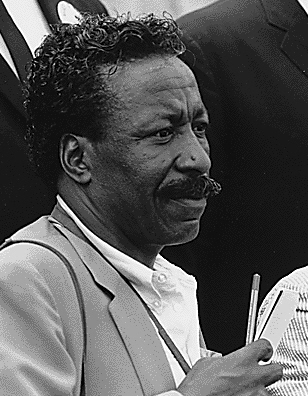The works selected for this exhibition highlighted the struggle African Americans endured whilst fighting for equality in America, a struggle that concerned Parks throughout his long and astonishing photographic career.
Gordon Parks: A Choice of Weapons shares its title with Parks' 1966 autobiography and this exhibition aimed to draw out critical questions concerning civil responsibility, human rights and modes of representation. Critically, this exhibition highlighted how Parks' photography informed the sense of responsibility he felt and the way he used his position to provide both agency and voice for his people. His immersive photographic narratives opened up dialogue across the difficult cultural, social and political divides that existed in America.

"He chose to use the position he achieved to represent his community in the struggle for social change”
— Mark Sealy

In late 1967 and as a direct response to the wave of riots that broke out across America, Parks began documenting the Fontenelles, an African American family living in Harlem and trapped in extreme conditions of poverty. This extended documentary project became a remarkable 16-page photo feature for Life magazine in March 1968.
It was a ground breaking essay which provides a keystone through which to read Park’s photography throughout the exhibition. An outstanding body of work, it illustrates the way he saw and portrayed the family and others: not as objects of journalistic scrutiny but as unique individuals participating in the telling of their own story. The heartache, emotional and moral dilemmas that he faced in trying to tell story of the Fontenelle family would never leave him. He stayed in contact with the family and would later recall that, "the truth of their suffering lay ahead, and it would be terrifying and sorrowful."

Gordon Parks' photographic career began in earnest in the early 1940s with the legendary Farm Security Administration photography unit. In the struggle for social justice his camera became what he referred to as his weapon of choice against racism and social inequalities.
In 1956, as the only African American photographer on the staff of the hugely influential Life magazine, he documented the impact of racial segregation in the American South. In the 1960’s he explored the turbulence of the different political strategies of those involved in the struggle for social freedom: from Dr. Martin Luther King Jr.'s participation in the March on Washington to the self-declared revolutionary approach of the Black Panthers. Parks' focus on the question of social change was unequivocal.
Banner image: Gordon Parks, Ella Watson with her Grandchildren, Washington DC, 1942. © and courtesy The Gordon Parks Foundation.
Exhibition preview: All images © and courtesy The Gordon Parks Foundation. 1+5) A Choice of Weapons installation at Side Gallery. Photo by Peter Scott. 2) Gordon Parks, Department Store, Mobile, Alabama, 1956. 3) Gordon Parks, Martin Luther King, Jr., Washington DC, 1963. 4) Gordon Parks, Ondria Tanner and her Grandmother Window-shopping, Mobile, Alabama, 1956.
About the artist: Gordon Parks at the Civil Rights March on Washington, 1963.
Autograph is a space to see things differently. Since 1988, we have championed photography that explores issues of race, identity, representation, human rights and social justice, sharing how photographs reflect lived experiences and shape our understanding of ourselves and others.